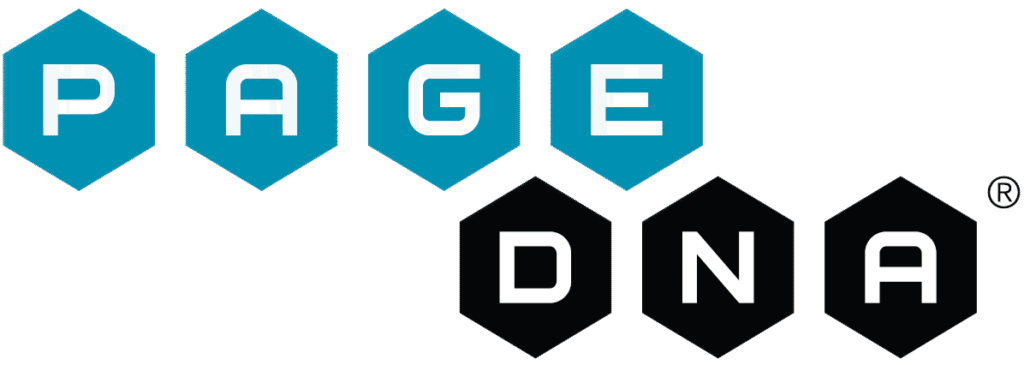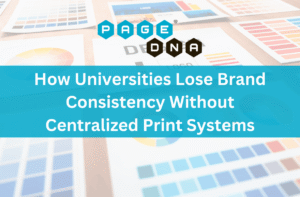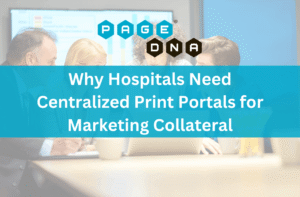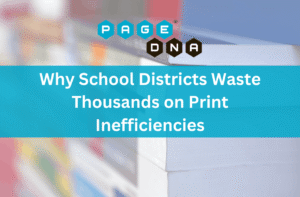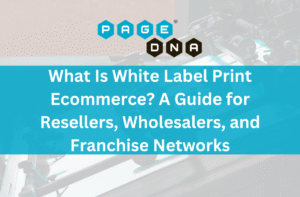For many print shops, the journey into e-commerce begins with WordPress and WooCommerce plugins. It’s familiar, accessible, and affordable. With a few plugins, it seems like the perfect solution to get a simple storefront up and running quickly. WordPress powers over 43% of all websites on the internet, so it’s a natural go-to.
However, as a print business grows, the very things that made WordPress so appealing in the beginning become its greatest weaknesses:
- Modularity becomes fragility: Plugin conflicts increase exponentially.
- Simplicity becomes limitation: Complex print needs can’t be met.
- Affordability becomes costly: Hidden costs pile up over time.
- Flexibility becomes chaos: Lack of print-specific features.
If this sounds familiar, it might be time to face the truth: your print shop has outgrown WordPress for an e-commerce platform. Here are five key signs that it’s time to make the move to a dedicated web-to-print platform.
Sign #1: Your Order Management is a Mess of Emails and Spreadsheets
In the early days, managing a handful of orders through email notifications and a simple spreadsheet might have been manageable. But as your business grows, this manual approach quickly descends into chaos.
The WordPress Reality
Most WordPress-based print shops rely on a patchwork system:
- WooCommerce notifications: Basic email alerts with limited information
- Manual spreadsheet tracking: Copy-paste order details from multiple sources
- Email chains: Endless back-and-forth about specifications and changes
- File management chaos: Attachments scattered across email threads
- Status confusion: No single source of truth for job progress
The Breaking Point
As order volume increases, this system breaks down completely:
Common Problems:
- Missed orders: Important emails get buried in overflowing inboxes
- Lost specifications: Critical details disappear in long email chains
- Version control issues: Multiple file versions create confusion
- Customer frustration: No way to provide accurate status updates
- Staff burnout: Hours spent searching for information
The Dedicated Solution
A platform feature like PageDNA’s Order Manager provides a centralized dashboard where you can track every job from the moment the order is placed to the moment it’s delivered.
Key Benefits:
- Real-time visibility: See all jobs at a glance
- Automated notifications: Customers get updates automatically
- Centralized files: All job assets in one secure location
- Status tracking: Clear progress indicators for every job (with an assignee)
- Search functionality: Find any order instantly
This real-time visibility eliminates the guesswork, streamlines your workflow, and frees you up to focus on what you do best: printing.
Sign #2: You Spend More Time Fixing Bugs Than Growing Your Business
The WordPress ecosystem is a delicate dance of plugins. You have a plugin for your e-commerce functionality (likely WooCommerce), another for your product options, another for your contact forms, and so on.
The Plugin Conflict Nightmare
Each plugin is developed by a different team, with its own update schedule and potential for conflicts:
The Domino Effect:
- WordPress core updates: Can break plugin compatibility
- Plugin updates: May conflict with other plugins
- Theme updates: Can override plugin functionality
- PHP version changes: May cause compatibility issues
- Security patches: Sometimes break existing functionality
- Failure to update: leaves unpatched plugins vulnerable to exploits
A simple update to one plugin, or to the WordPress core itself, can create a domino effect, breaking your entire workflow and bringing your online sales to a grinding halt, while failing to update can be even worse.
The Security Vulnerability Problem
According to WordPress security research, websites with multiple plugins face exponentially higher security risks:
- Plugin vulnerabilities: Each plugin is a potential entry point for hackers
- Outdated plugins: Unmaintained plugins become security liabilities
- Code conflicts: Interactions between plugins can create unexpected vulnerabilities
- Update delays: Fear of breaking the site delays critical security updates
The PageDNA Difference
PageDNA is a fully managed and supported platform, with a dedicated team ensuring stability, security, and seamless updates:
Platform Advantages:
- Single codebase: No plugin conflicts, with monthly feature releases and real-time bug fixes when needed.
- Professionally maintained: Dedicated team manages all updates so no IT headaches.
- Enterprise-grade security: Bank-level protection and 99.9% uptime.
- AWS hosted: Global reliability and scalability on world-class infrastructure.
- Expert support: Direct access to print industry specialists.
Instead of being a part-time IT manager, you can focus on growing your business, confident that your online storefront is in expert hands.
Sign #3: You Can’t Offer the Complex Products and Pricing Your Customers Need
Print is not a simple commodity. It’s a complex, highly customizable product with a multitude of variables that affect pricing and production.
The Limitations of WooCommerce for Print Shops
While plugins like WooCommerce are great for selling t-shirts and coffee mugs, they simply aren’t built to handle print complexity:
Print-Specific Challenges:
- Variable pricing: Complex calculations based on quantity, size, paper, finishing
- Product dependencies: Certain options only available with specific substrates
- File requirements: Different specs for different products
- Proofing workflows: Online approval processes
- Variable data: Personalization and customization options
The Workaround Trap
Print shops often find themselves creating convoluted workarounds:
- Multiple plugins: Trying to approximate functionality with various tools
- Custom code: Expensive development that breaks with updates
- Manual processes: Staff intervention for complex orders
- Limited options: Simplified products that don’t meet customer needs
- Poor user experience: Confusing ordering process drives customers away
PageDNA’s Print-Specific Power
A dedicated web-to-print platform like PageDNA is designed specifically for the print industry:
Advanced Capabilities:
- Dynamic pricing engine: Handles unlimited variables and rules
- Product configurator: Visual product building with real-time previews
- Online proofing: Integrated approval workflows
- Variable data printing: Full personalization capabilities
- Template management: Brand-compliant customization options
- File validation: Automated preflighting and quality checks
This allows you to offer the sophisticated products and services that your customers demand while maintaining profitability and efficiency.
Sign #4: Your Customer Experience is Clunky and Unprofessional
Your website is your digital storefront, and in today’s competitive market, a clunky, unprofessional customer experience can be a deal-breaker.
The Generic WordPress Problem
A standard WordPress theme with a patchwork of plugins creates several issues:
User Experience Problems:
- Generic appearance: Looks like every other WordPress site
- Confusing navigation: Print-specific needs not considered in design
- Slow loading: Multiple plugins bog down performance
- Mobile issues: Responsive design problems with complex forms
- Checkout friction: Generic e-commerce flow doesn’t fit print workflows
Missing Print-Specific Features
WordPress lacks essential print industry features:
- Online proofing: No integrated approval system
- Reorder functionality: Can’t easily repeat past orders
- File upload optimization: Poor handling of large print files
- Branded portals: No way to create customer-specific storefronts
- Approval workflows: No built-in routing for multi-step signoffs
Creating a “Raving Fan” Experience
Customer experience is the top differentiator in the print industry. PageDNA allows you to create a custom, branded storefront designed specifically for print ordering:
Customer Experience Features:
- Branded interface: Fully customized to match your brand
- Intuitive navigation: Designed for print workflows
- Visual product builders: See products before ordering
- One-click reordering: Easy repeat business
- Customer portals: Personalized experiences for different clients
- Mobile optimization: Perfect experience on any device
This professional, user-friendly experience builds customer loyalty and drives repeat business.
Sign #5: You Have No Real Insight into Your Business Performance
In a WordPress-based workflow, your data is scattered across multiple plugins and spreadsheets, making it nearly impossible to get a holistic view of your business performance.
The Data Fragmentation Problem
Your critical business information is trapped in silos:
Data Sources:
- Sales data: Locked in WooCommerce
- Customer data: Scattered across contact forms and plugins
- Production data: Tracked in separate spreadsheets
- Financial data: Manual entry into accounting software
- Marketing data: Google Analytics provides limited insights
The Decision-Making Challenge
Without integrated data, you’re forced to make critical business decisions based on:
- Incomplete information: Missing key performance indicators
- Outdated data: Manual reporting delays insights
- Gut feelings: Intuition instead of data-driven decisions
- Reactive management: Problems discovered too late
- Limited forecasting: No predictive analytics capabilities
PageDNA’s Business Intelligence
A dedicated platform like PageDNA provides robust reporting and analytics capabilities:
Comprehensive Analytics:
- Real-time dashboards: Live business performance metrics
- Customer insights: Detailed behavior and preference analysis
- Product performance: Which items drive the most profit
- Operational efficiency: Production bottlenecks and opportunities
- Financial reporting: Integrated profit and loss analysis
- Predictive analytics: Forecast future trends and demands
This data-driven approach to decision-making is essential for sustainable growth and profitability. As noted by Harvard Business, companies that make decisions based on data are 5x more likely to make faster decisions and 3x more likely to execute decisions as intended.
The True Cost of Staying on WordPress
While WordPress may seem like the economical choice, the hidden costs add up quickly:
Direct Costs:
- Premium plugins: $500-2,000+ annually
- Custom development: $5,000-100,000+ for print-specific features
- Maintenance: $200-500+ monthly for updates and fixes
- Security: Additional costs for backup and security plugins
- Hosting: Higher-performance hosting for plugin-heavy sites
Indirect Costs:
- Lost sales: Downtime and poor user experience
- Staff time: Hours spent managing technical issues
- Opportunity cost: Time not spent on business growth
- Customer churn: Poor experience drives customers away
- Competitive disadvantage: Falling behind more agile competitors
Dependence Risk:
Relying on a single developer or small team to maintain and customize a WordPress site introduces real operational risk. If availability changes or priorities shift, progress can slow or stall—potentially affecting your online ordering, pricing, and production workflows. In contrast, a dedicated platform like PageDNA provides a full support organization, continuous updates, and proven uptime, so your business isn’t dependent on any one person or team.
Making the Transition: Why PageDNA is the Smart Choice
When you’re ready to move beyond WordPress, PageDNA offers the comprehensive solution your growing print business needs:
Implementation Support:
- Guided migration: Expert team handles the transition
- Data transfer: Seamless movement of existing customer and product data
- Training: Comprehensive staff training on the new system
- Go-live support: Dedicated assistance during launch
- Ongoing optimization: Continuous improvement recommendations
Long-Term Partnership:
- Dedicated support: US-based team of print industry experts
- Regular updates: Continuous platform improvements
- Feature development: New capabilities based on industry needs
- Strategic guidance: Business growth consultation
- Community: Network of successful print professionals
Conclusion
WordPress is a great starting point for many print shops, but it’s not a destination. As your business grows and your needs become more complex, the limitations of a plugin-based solution become increasingly apparent.
The signs are clear:
- Order chaos: Manual processes can’t scale
- Technical debt: More time fixing than growing
- Limited capabilities: Can’t meet customer demands
- Poor experience: Generic solutions don’t impress
- Data blindness: No insights for smart decisions
If you’re experiencing these challenges, you’re not alone. Thousands of print shops have successfully made the transition from WordPress to dedicated web-to-print platforms.
By investing in a purpose-built solution like PageDNA, you can:
- Eliminate technical headaches and focus on your business
- Offer sophisticated products that command premium pricing
- Deliver exceptional experiences that create loyal customers
- Make data-driven decisions that drive profitable growth
- Scale efficiently without proportional increases in overhead
The question isn’t whether to upgrade, it’s how quickly you can implement the platform that will transform your business and secure your competitive advantage.
Frequently Asked Questions
Can I integrate PageDNA with my existing WordPress site?
Yes, many print shops choose to use PageDNA for their storefront and ordering functionality while continuing to use their WordPress site for their blog and other marketing content. PageDNA can be seamlessly integrated with your existing WordPress site, allowing customers to move between your marketing content and ordering system without disruption. This hybrid approach gives you the best of both worlds: WordPress for content marketing and PageDNA for print commerce.
Is PageDNA more expensive than using WordPress plugins?
While the initial investment in a dedicated platform like PageDNA may be higher than the cost of a few WordPress plugins, the total cost of ownership is often much lower. When you factor in the hidden costs of premium plugins ($500-2,000+ annually), custom development ($5,000-100,000+), ongoing maintenance ($200-500+ monthly), security measures, and lost sales due to downtime, a dedicated platform provides significantly better ROI and eliminates the ongoing technical headaches.
How long does it take to migrate from WordPress to PageDNA?
PageDNA offers a guided implementation process to make the migration as smooth and efficient as possible. The typical timeline is 49-69 days from kickoff to launch, depending on the complexity of your needs and customization requirements. PageDNA’s team of experts handles the technical aspects of migration, including data transfer, system configuration, and staff training, minimizing disruption to your business operations.
Can PageDNA handle variable data printing and complex customization?
Yes, PageDNA has a powerful variable data printing engine that can handle even the most complex personalization requirements. Unlike WordPress plugins that struggle with print complexity, PageDNA is built specifically for the print industry and supports advanced features like dynamic templates, conditional logic, database integration, real-time previews, and automated file generation. This allows you to offer highly targeted and effective marketing materials that command premium pricing.
What kind of support does PageDNA offer compared to WordPress?
PageDNA is known for its exceptional, US-based customer support with an average response time of 1.2 hours. When you have a question or issue, you have a single point of contact and a dedicated team of print industry experts who understand your business. This is vastly different from WordPress, where you might need to contact multiple plugin developers, theme creators, and hosting providers to resolve a single issue, often receiving conflicting advice or no response at all.
